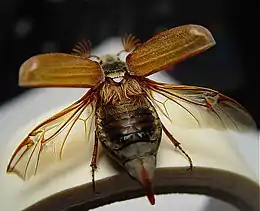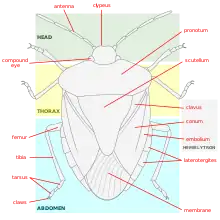Elytron
An elytron (/ˈɛlɪtrɒn/;[1] from Greek ἔλυτρον "sheath, cover"; plural: elytra /-trə/)[2][3][4] is a modified, hardened forewing of certain insect orders, notably beetles (Coleoptera) and a few of the true bugs (Hemiptera) such as the family Schizopteridae; in most true bugs, the forewings are instead called hemelytra (sometimes alternatively spelled as "hemielytra"), as only the basal half is thickened while the apex is membranous. An elytron is sometimes also referred to as a shard.


.jpg.webp)
Description
The elytra primarily serve as protective wing-cases for the hindwings underneath, which are used for flying. To fly, a beetle typically opens the elytra and then extends the hindwings, flying while still holding the elytra open, though some beetles in the families Scarabaeidae and Buprestidae can fly with the elytra closed.
In some groups, the elytra are fused together, rendering the insect flightless. Some of the ground beetles (family Carabidae) are a good example of this.
References
- https://www.collinsdictionary.com/dictionary/english/elytron
- Michelle Gleeson (2016), Miniature Lives: Identifying Insects in Your Home and Garden, CSIRO Publishing, p. 313, ISBN 9781486301386
- Augustus Radcliffe Grote (1909), Canadian Entomologist, 41, Entomological Society of Canada
- ἔλυτρον. Liddell, Henry George; Scott, Robert; A Greek–English Lexicon at the Perseus Project.